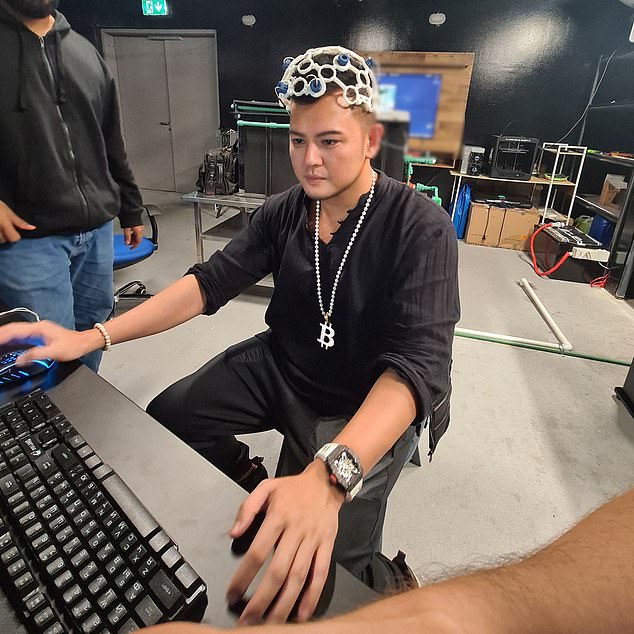
Futurist Millionaire Developing Genetically-Enhanced Humans Predicts Timeline for Obsolescence of Ordinary People
[Image 1: Herbert Sim wearing a high-tech helmet connected to a computer. Caption: Herbert Sim demonstrates Neurochip’s brainwave-reading technology, a step toward human enhancement.]
Humanity’s Future: Tech Millionaire Predicts Superhuman “Mutants” Within Five Years
Herbert Sim, a London-based tech investor and futurist, claims humanity could be eclipsed by a new race of transhuman “mutants” as early as five years from now. Through his company, Neurochip.com, Sim is pioneering technologies to merge human biology with artificial intelligence and genetics, aiming to grant abilities once confined to sci-fi—like lifespans of 500 years or telepathic communication.
The Rise of Transhuman Tech
Sim’s Neurochip uses a helmet that converts brainwaves into digital actions, enabling users to control devices mentally. “This is just the first step,” Sim told DailyMail.com. “Transhumanism could let us cure diseases, enhance intelligence, and even achieve digital immortality.” He envisions a future where enhanced humans outperform ordinary people in every way, rendering unmodified humans obsolete.
[Image 2: Scientists in a lab examining a rodent embryo. Caption: Japanese researchers created animal-human hybrids to grow transplant-ready organs.]
Real-World Breakthroughs
Japan recently greenlit experiments growing human cells in animal embryos. Stem cell biologist Hiromitsu Nakauchi successfully engineered rodents with human pancreatic cells, aiming to grow organs for transplants. Sim argues such innovations are proof of transhumanism’s potential: “These ‘superpowers’ are now within reach through genetics and AI.”
Similarly, CRISPR gene-editing tools now allow precise insertion of large DNA sequences, potentially curing genetic disorders or extending lifespans. Meanwhile, MIT researchers transformed skin cells into functional brain cells, a leap toward repairing neurodegenerative diseases.
Merging Mind and Machine
In 2022, startup Synchron implanted a brain-computer interface (BCI) in an ALS patient via a neck vein, enabling them to control devices through thought. Sim’s Neurochip tech parallels this, decoding neural signals to interact with machines—a precursor to seamless human-AI integration.
[Image 3: A futuristic silhouette with glowing circuits. Caption: Transhumanism blends biology with tech—could enhanced humans dominate society?]
Ethical Dilemmas and Sci-Fi Warnings
While Sim champions these advances as humanity’s “redemption,” critics warn of ethical risks. The vision of superhumans mirrors dystopian tales like X-Men or The Terminator, where enhanced beings dominate society. Sim acknowledges fears but insists tech’s role is to empower, comparing skepticism to ancient humans dismissing dragons as myth—until evidence proved otherwise.
“We’re at a crossroads,” he said. “Embracing these tools could save lives, but resisting ensures obsolescence.” As science accelerates, the line between human and machine blurs, leaving society to grapple with what it means to stay “human” in a world of self-engineered evolution.


